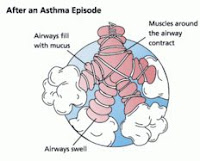 In a birth cohort study, wheezing symptoms were recorded postpartum over two first years of age and subsequently cognitive status of children at the age of 3 yr was assessed with the Bayley Mental Development Index (MDI).
In a birth cohort study, wheezing symptoms were recorded postpartum over two first years of age and subsequently cognitive status of children at the age of 3 yr was assessed with the Bayley Mental Development Index (MDI).The MDI score correlated inversely with the number of wheezing days recorded over 24 months, lead cord blood concentration, number of siblings and the number of cigarettes smoked daily by other household members at home over the pregnancy period.
According to the study authors, this is the first report in the iterature showing that early wheezing is associated the cognitive deficit in very young children. Observed cognitive deficit may be caused by RSV infections or can be related to lower lung function attributed to persistent wheezing, which reducing oxygen supply would affect rapidly developing brain.
However, considering that the number of siblings was also associated with cognitive decline, we should await more studies before making final conclusions.
References:
Early wheezing phenotypes and cognitive development of 3-yr-olds. Community-recruited birth cohort study. Wieslaw Jedrychowski et al. Pediatric Allergy and Immunology, 06/2009.
Allergic sensitization is associated with rhinovirus-, but not other virus-, induced wheezing in children. http://goo.gl/PghX
A simple clinical prediction rule identifies healthy newborns at risk of RSV Bronchiolitis in Healthy Newborns http://goo.gl/EVlSi
Image source: Wikipedia, public domain.